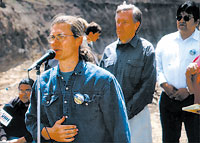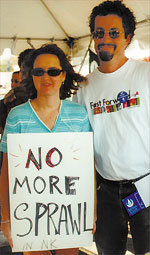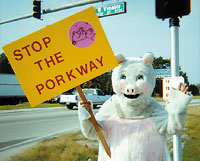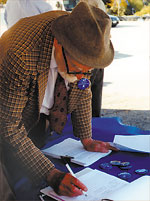|
Wearing time. Performing skits on an agency's step. Gathering signatures and blue jeans. Name it, and EPEC organizers have done it.
Arizona
 Through
grassroots activism and coalition building with Native Americans,
activists won a settlement including closure of the White Vulcan Pumice
Mine within six months. The company has 10 years to remove already
extracted pumice and must then restore the site. This victory, along
with the 20-year Mineral Withdrawal of 74,000 acres, will help restore
and protect the San Francisco Peaks. Through
grassroots activism and coalition building with Native Americans,
activists won a settlement including closure of the White Vulcan Pumice
Mine within six months. The company has 10 years to remove already
extracted pumice and must then restore the site. This victory, along
with the 20-year Mineral Withdrawal of 74,000 acres, will help restore
and protect the San Francisco Peaks.
California
 Working
alongside dozens of volunteers from Audubon, Friends of the Northern
San Jacinto and San Timoteo Canyonlands Coalition, Club activists
helped create a consistent anti-sprawl presence at all Riverside County
Integrated Plan committee and community meetings, which numbered more
than 240 forums. The Club is assisting in the county's mapping process
to delineate roads, wildlife areas and new housing in an effort to
curb sprawl. Working
alongside dozens of volunteers from Audubon, Friends of the Northern
San Jacinto and San Timoteo Canyonlands Coalition, Club activists
helped create a consistent anti-sprawl presence at all Riverside County
Integrated Plan committee and community meetings, which numbered more
than 240 forums. The Club is assisting in the county's mapping process
to delineate roads, wildlife areas and new housing in an effort to
curb sprawl.
Volunteers and staff mobilized San Clemente community members to help protect the last large pieces of undeveloped land in Orange County from sprawl. They collected and delivered thousands of postcards to targeted officials and 6,500 people signed on to the activist list as a result of tabling at farmers markets and beaches. Through e-mail activism, many letters to the editor written by Club volunteers appeared in various newspapers, including the Los Angeles Times.
In Tracy, the Sierra Club became a household name - a very strong, recognizable force - due to its anti-sprawl organizing.
Delaware As a result of the Club's efforts, the U.S. Army Corps of Engineers and the State of Delaware now recognize relic shoals at the mouth of Delaware Bay as essential fish habitat, which can no longer be used as a source of sand for beach replenishment.
Florida
 Volunteers
worked to halt the Ridge Road extension to the Suncoast Parkway in
efforts to stop sprawl. Letters generated by Club organizers had a
strong impact on the permitting agencies in Pasco County, and the
Environmental Protection Agency has weighed in against the extension.
The county was sent back to the drawing board numerous times by the
water management district and the Army Corps of Engineers. Volunteers
worked to halt the Ridge Road extension to the Suncoast Parkway in
efforts to stop sprawl. Letters generated by Club organizers had a
strong impact on the permitting agencies in Pasco County, and the
Environmental Protection Agency has weighed in against the extension.
The county was sent back to the drawing board numerous times by the
water management district and the Army Corps of Engineers.
Hawaii
In February, volunteers' 14 years of hard work culminated in the governor's decision to cancel plans for the expansion of Maui's Kahului Airport. The Club is working to create dialogue with other local community groups, such as the Chamber of Commerce, corporate landowners, tourism and unions around protecting Maui's coastal lands.
Idaho
The Club's ongoing work to permanently protect the Owyhee Canyonlands has elevated awareness to the national level. Activists met with Interior Secretary Bruce Babbitt to discuss proposed national-monument designation. After filling hearing rooms and printing full-page ads in local newspapers, the Club celebrated the expansion of Craters of the Moon National Monument.
Illinois
Organizers with the Illinois Clean Water Campaign are working toward improving enforcement of the Clean Water Act in the state. The removal of three dams on the Fox River is being actively considered, and Lt. Gov. Corinne Wood sought Club input and support in crafting her Illinois Rivers 2020 proposal to restore habitat in the Illinois River watershed. Gov. George Ryan also proposed "anti-degradation" rules that will protect clean streams from new or increased discharges of pollution.
Kentucky
Organizers are working to secure countywide moratoria on animal factories, and helped pass regulations on them. The Club also attracted new activists and significant media attention with its first-ever "Tour de Stench."
Louisiana
Club activists and staff helped stop a proposal to develop golf courses in state parks, and worked to oppose wetland destruction. The state's first "Tour de Sprawl," along with the release of two national reports, "Sprawl Costs Us All" and "Smart Choices or Sprawling Growth," generated valuable public attention and created new opportunities to join forces with other anti-sprawl organizations.
Minnesota
Key volunteers met with forest planners to discuss alternative forest-management plans in an effort to stop commercial logging in national forests. It became increasingly difficult for the logging community and the Forest Service to ignore activists, as 80 volunteers packed the Duluth wild forest hearing in May.
Mississippi
Activists continue to work to maintain the suspension of CAFO permitting. Using litigative and administrative intervention, the Club has been able to bird-dog the industry's efforts.
New York
The Club has long advocated cleanup of the Hudson River, while General Electric, which is responsible for dumping PCBs into the river, has continuously dug in its heels. In a last-ditch effort, GE filed a lawsuit to have the 20-year-old Superfund cleanup law declared unconstitutional, just as the EPA was about to announce its clean-up plan. The Club will continue to weigh in during the EPA's comment period.
North Dakota
More than 12,000 comments were sent to the Forest Service regarding the Grasslands Management Plan Revision due to strong mobilization efforts by Club organizers. The Club's message to protect wildlands is becoming more visible as local and national media have garnered attention throughout the state.
Ohio
Cincinnati-area organizers stopped the proposed Monroe mega-mall in Deerfield Township through an effective and aggressive public anti-sprawl campaign. After the Club generated the greatest number of comment letters the Ohio Department of Transportation ever received and gained media attention locally and statewide, developers withdrew their applications to change key zoning laws.
Oklahoma
Volunteers played a key role in initiating and pursuing litigation against hog-factory owner Seaboard Corporation for violations of the Clean Water Act. The Club gathered evidence and located individuals and expert witnesses to testify against Seaboard. Activists also publicly exposed shocking conditions at the abandoned Cimmaron pork facilities, forcing the Oklahoma Department of Agriculture to hold hearings on the violations.
Oregon
Organizers conducted a massive campaign to educate the public about the need to protect Steens Mountain and the high desert of southeastern Oregon from mining and livestock grazing.
Rhode Island
 With
the release of the "Nasty Nine" Rhode Island Sprawlers Map, organizers
helped galvanize opposition to the Quonset Point Port through education
and significant media attention, including NPR coverage. Residents
turned out in force at hearings to voice their concerns about the
port. With
the release of the "Nasty Nine" Rhode Island Sprawlers Map, organizers
helped galvanize opposition to the Quonset Point Port through education
and significant media attention, including NPR coverage. Residents
turned out in force at hearings to voice their concerns about the
port.
South Dakota
Generating 8,500 of 10,000 comments received, activists helped defeat an attempt by Rep. John Thune to exempt the wild and scenic Missouri River from the National Park Service's Jet Ski ban. The Club also urged the state to begin developing plans to protect the Big Sioux River from dumping and pollution.
Tennessee
Organizers helped turn out volunteers for the wild forest hearings in Tennessee and Mississippi, generating demand for protecting national forests. The Club also established a coalition with a major Tennessee recreation organization in order to increase the Club's visibility and raise awareness around ending commercial logging.
Texas
Anti-sprawl organizers in Houston focused their efforts around support of light rail. Efforts to appeal to non-traditional environmental audiences, such as Texas Southern University and the Spanish-speaking media, continue to build support for the Club's work.
Utah
 In
an effort to stop sprawl and protect wilderness, organizers in Salt
Lake City focused on promoting light rail and halting new proposals
to create the Legacy Highway, which would connect Salt Lake City with
outlying areas. Volunteers helped gather the largest turnout for the
Utah Wilderness Coalition's rally in support of Utah wilderness. In
an effort to stop sprawl and protect wilderness, organizers in Salt
Lake City focused on promoting light rail and halting new proposals
to create the Legacy Highway, which would connect Salt Lake City with
outlying areas. Volunteers helped gather the largest turnout for the
Utah Wilderness Coalition's rally in support of Utah wilderness.
Virginia
The Club continued its fight against the King William Reservoir, collaborating with the Mattaponi Native American tribe. After a strong public-education effort in Newport News, more than 2,400 post cards were presented on a 60-foot-long "Wall of Support" to the Army Corps of Engineers in support of the Corps' opposition to the reservoir. A final decision on the reservoir is expected in the summer of 2001.
Washington D.C.
Advocating rail alternatives instead of expanding the beltway, organizers and volunteers have called for light rail as a solution to solving traffic congestion. The Club also successfully encouraged re-investment in core communities such as Oxon Hill and federal government partnerships with private enterprise in re-development efforts in the city.
- Jen Jackson and David Schneider
Photo credits from top to bottom:
Peak Performance: At a ceremony on Arizona's San Francisco
Peaks, EPEC organizer Andy Bessler indicates his hearfelt thanks to
U.S. Secretary of the Interior Bruce Babbit for his work to shut down
a pumice mine on the mountain. Behind Bessler are Babbit and former
Havasupai Chairman Lester Crook.
No to the Container Port: These residents
of North Kingston, R.I., made their own hand-lettered sign for an
anti-sprawl rally.
Florida Chapter Volunteer Bob Biolzi dons a pig
costume to protest the sprawl-inducing Suncoast Parkway - or Porkway,
in this case.
The birds in this photo aren't gathering for a
rally, but if they were aware their wetland habitat is threatened
by the proposed Legacy Highway in Utah - another EPEC site - they
might sign up for the fight.
Rhode Island activist Irving Spaulding registers
his opposition to a proposed container port.
Up to Top
|